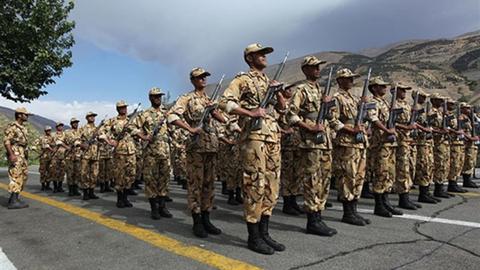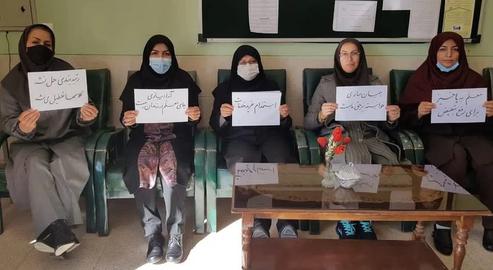On Saturday, January 29, a spokesman for the Iranian parliament’s Budget Committee for 2022-23 said members had agreed that exemptions from military service could again be sold to individuals at a cost of 250 to 600 million tomans (US$9,000 to $21,500).
The news met with widespread outrage. A buy-out scheme was in place in Iran until three years ago, when it was dropped from regulations on the basis that it only benefited the wealthy. As it stands, the Iranian Constitution requires all men aged between 18 and 49 to go for military service or conscription for a period of 18 months to two years, and waivers are not currently available for purchase under the law.
Then on the Monday morning, the IRGC-affiliated Fars News Agency reported that the proposal had been withdrawn. But the budget bill for the next financial year is still being debated, and the revelation that this proposal was on the table at all has shaken many.
What Happened?
At the opening of the week’s business on Saturday, speaker Rahim Zareh confirmed the Budget Committee’s intention to reimplement the buy-out scheme, saying members had based their decision on the “sacred” nature of family and childbearing as well as the need close the cases of long-term absentees.
Though Fars News Agency gave no explanation for the about-turn on Monday, much of the opposition voiced online came from former government officials and people close to the upper tiers of the regime.
One of the Rouhani-era officials to take a stand was Mohammad Javad Azari Jahromi, the former minister of communications and technology. Writing on Twitter, with some irony, the co-architect of Iran’s recent internet shutdowns said the idea was “anti-social justice” and pandered to “the demands of capitalists”.
Abdolreza Davari, an economist and former media adviser to Mahmoud Ahmadinejad, also opposed the bill. He posted a comparison on Twitter between the cost of exemptions in the Khatami era and the prices proposed by the Budget Committee, remarking: “Apparently, Khatami was more supportive of the deprived." This was a reference to Ebrahim Raisi’s 2021 presidential campaign slogan, in which the now-president declared himself “supporter of the deprived”.
Ordinary Iranians also criticized the proposal online, describing it as a “punishment” for young people who had already spent their money on education. In Iran a BA or MA at a non-governmental university, where about 75 percent of students now enrol, can cost up to 400 million tomans, and a PhD 600 million. Other observers said that as before, the scheme would only benefit the “Aghazadehs”: a Persian slang term for the pampered children of high-level regime insiders.
Was the Government Looking to Make a Quick Profit?
IranWire interviewed Saeed Peyvandi, a sociologist and professor at the University of Laurent in Paris, who has prior military experience of the IRGC, on the causes and likely ramifications of such a change to the rules.
“The military in Iran,” Peyvandi said, “and many other countries too, is by no means a solely commercial enterprise. It has its own spiritual identity. Military service is a promise made by the younger generation to their community to train so that if one day their country is in danger, they can help.”
In 2022, specialist and automated weapons mean fewer and fewer on-the-ground troops are needed. As such military service has been rendered practically obsolete in many countries, Peyvandi said, and “selling exemptions is extortion of the citizenry – and a penalty imposed on young men who already had to pay heavy costs for their education. It is the commodification of military service. The Iranian government has turned what has been, according to its own propaganda, a national sanctity, into a vehicle for profit.”
Furthermore, he added, “The legalization of such schemes gives those who can afford it the privilege of not going to military service, and those who have no money – and they are in the majority – no choice. This means the government’s view on this matter is class-based, while the policy would exacerbate class divides.”
“This issue also has symbolic weight and can lead to the distancing of young men and adolescents from their country. According to opinion polls, more than a third of the Iranian population, or about 35 percent, wants to emigrate. The rate is more than 50 percent among young people, and even higher among educated young people. This kind of blackmail only exacerbates that rift."
Are All Soldiers Equal During Military Service?
Kaveh is a now 40-year-old citizen of Iran who went for military service 10 years ago, having just completed his master's degree at the University of Tehran. He told IranWire about his experience of barracks life: one, he believes, that was a great leveller for young men of disparate backgrounds.
“One of the advantages,” he said, “was that it was psychologically significant after a period at university, when many of us were plagued by class antagonism and couldn’t keep up with our wealthier peers. In the military, the conditions were the same for everyone. In college, the students from very affluent families were on night courses, and rode in cars even nicer than the professors’ ones. They could easily emigrate when they finished, while some of us didn’t even have the money for a language class.
“This gulf was bridged by military service. Despite the psychological stress, we knew it was the same for everyone. We were all equal in suffering, regardless of somebody’s father's position or family assets. It made it easier for everyone to endure it.”
Only extending the offer of exemptions to a certain social class, he said, would add to the stress of military service for those left behind. “Military service is really hard-going. It’s definitely harder for today's teenagers; young people today have a better grasp of their rights and, of course, how to be happy. These young people will suffer more in the military environment and, of course, from the discrimination that waiver sales would impose on their section of society.
“It would deepen the class divide that has already intensified recently. It will further drive the resentments of the lower classes toward anger and hatred of the rich. Another rupture these legislators ignored is that of families: imagine how bad a young boy may feel because his father cannot afford to buy him an exemption, and the sense of inadequacy and frustration for the head of the family, when their child’s life is at stake.”
In Kaveh’s view, some young men’s lives really are at stake during military service even in peacetime. “We must not forget that in addition to taking up two years of life, military service, especially in border areas and areas that on the drug transit routes, can also come with life-threatening risks for conscripts. It’s not just a matter of ridding oneself of a difficult time, but also a matter of life and death. Selling exemption from military service implicitly means that anyone with money can escape, and a person who has no money is left in danger."
Related coverage:
Iranian Study: One in 13 Soldiers Are Heavy Drug Users
Military Service: A Nightmare for Minority Recruits
Conscription Damages Iranian Youth
Gay Iranian Man Murdered by Family on Being 'Outed' by Military Service Card
The IRGC's Social, Cultural, Scientific and Educational Institutions
visit the accountability section
In this section of Iran Wire, you can contact the officials and launch your campaign for various problems

























comments